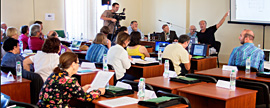Georgian Folk Music Laboratory of the V. Sarajishvili Tbilisi State Conservatoire
The study room of Georgian music, founded in 1935, was formed an independent unit Laboratory of Georgian Folk Music at the Music History Department in 1946. It was headed by Grigol Chkhikvadze (1935-1949); Vladimer Akhobadze (1953-1959); Kakhi Rosebashvili (1959-1974); Temur Eristavi (1974-1975); Merab Odisharia (1975-1977); Rusudan Kutateladze (1977-1981); Ketevan Matiashvili (1989-present).
As the Conservatoire Archive documentations say that Dimitri Araqishvili, Valentine Kuftina, Shalva Mshvelidze, Shalva Aslanishvili, Iona Tuskia, Grigol Kokeladze, Nikoloz Sharabidze performed their scientific work here. At various times among the employees of the Laboratory were: Lia Abuladze, Tsitso Khomeriki, Irakli Khatiashvili, Tsiala Luashvili, Edisher Garaqanidze, Natalia Zumbadze, Mariam Ositashvili, Tamaz Gabisonia, Tinatin Zhvania, Tamar Chokhonelidze, Tea Gogotishvili, Tamar Dgebuadze, Maka Khardziani, Ekaterine Diasamidze, Magda Sukhiashvili; currently specialists Nino Makharadze, Nino Nakashidze, Nino Pirtskalava, Otar Kapanadze and Teona Rukhadze continue their activities there.
In 1949 Georgian Folk Music Section of Music History department was created on the basis of the Folklore Laboratory. As a rule the Department members “made their first steps at the Laboratory”. The employees of Georgian Folk Music Department and Laboratory were people with versatile education (folklorists, historians, theoreticians, composers, ethnologists); among them were: Mindia Zhordania, Kakhi Rosebashvili, Otar Chijavadze, Evsevi (Kukuri) Chokhonelidze, Edisher Savitsky, Baram Baramidze, Tamar Meskhi, later: Joseph Jordania, Vladimer Gogotishvili; parallel to pedagogical work many of them were involved in collecting activity and enriched the Laboratory fund of expedition audio recordings, first examples of which date back to 1927-1928 (here we imply the wax cylinder collections of Shalva Mshvelidze, Grigol Chkhikvadze, Shalva Aslanishvili, Vladimer Akhobadze and others). It should be noted that the recordings session (in a combined way) of the unique Shemokmedi School variants of Gurian chants performed by accomplished chanter – Artem Erkomaishvili was held at the Georgian Folk Music Laboratory in 1966.
To the activity of the Department and Laboratory elder generation testifies the invaluable material collected in different ethnographic regions of Georgia, handwritten transcriptions, papers delivered at scientific sessions and conferences, concert-performance and publishing activity, collaboration with Soviet (Evgeny Gippius, Zinaida Evald, Eduard Alekseev, etc) and Western scholars (Alan Lomax, Erich Schtockmann, Yvette Grimaud, Morita Minoru and others).
In 2003 on the basis of Folk Music Department and Laboratory International Research Centre for Traditional Polyphony was founded; with the help of international and local governmental organizations the Centre has realized a number of successful projects. Today the Laboratory fund comprises:
- Audio archive (collections of expedition recordings, state and private collections, released LPs and CDs);
- Video recordings;
- Photos, slides;
- Printed material (transcription and scientific work collections, abstracts, books, journals, newspapers, these, booklets, etc);
- Manuscripts (scientific works, diplomas, dissertation works, notated material, expedition diaries, etc);
- Reports, accounts, letters, etc;
- Collection of folk musical instruments.
Parallel to the educational process and scientific work of the Conservatoire, at the Laboratory audio recordings are copied-renewed, restored, copies are made, processed and edited, transcribed, included into the data base; audio, notated, photo and other materials are identified, certified, catalogued; public lectures are recorded…. the specialists consult students, school pupils and teachers, choir masters, ensembles, lovers of traditional music, guests from Georgia’s regions and abroad on daily basis.
From the day of its inception the Laboratory had scientific direction, which it has maintained even after the abolition of scientific staff; the employees actively publish works, books, archival audio recordings, notated collections, articles, deliver papers at national and international forums and symposia, are involved in collecting activities, participate in projects, television and radio programs.




